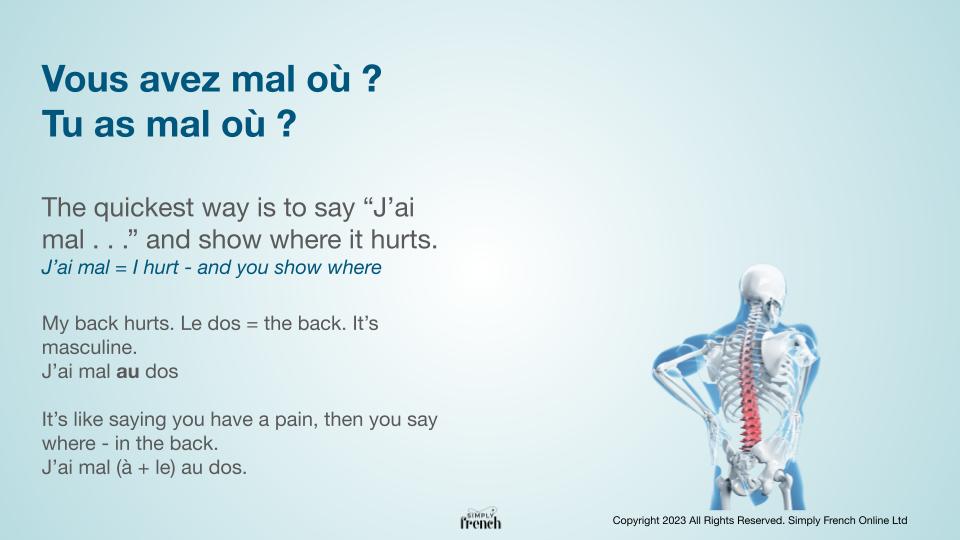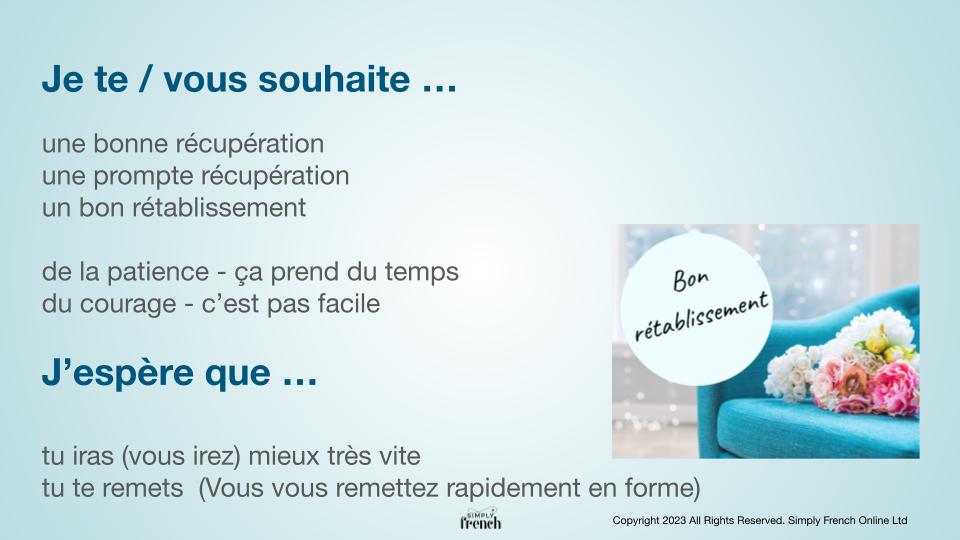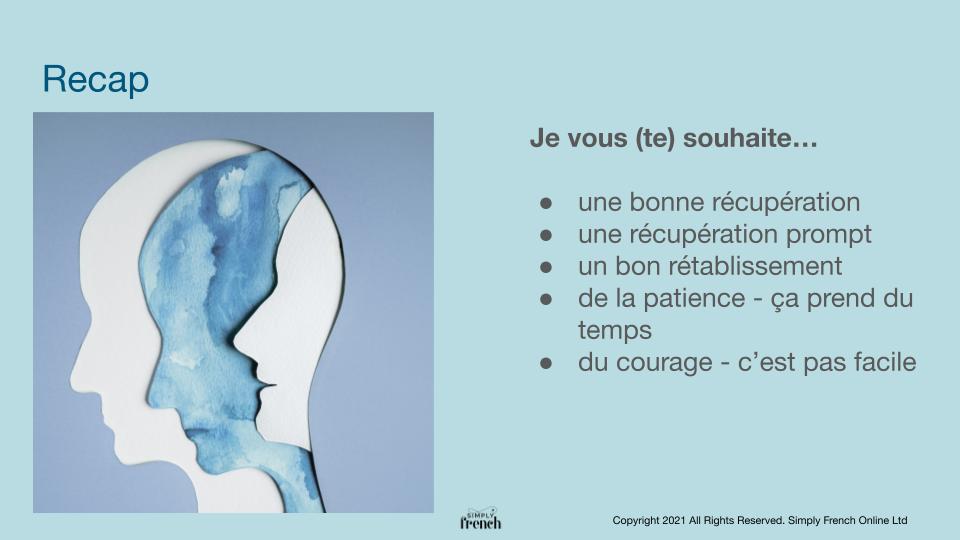How to say you are sick when in France
Jan 16, 2023Imagine you are in a French-speaking country and you are…sick.😱😱😱
Don’t get caught out when you’re feeling your worst and need to speak to a doctor. And it’s ok - we don’t expect to get sick. But we know it can happen.
In this week's video lesson, you discover:
- How to say you are sick when in France
- How to say where it hurts - the simplest way
- How to wish for someone to get better soon.

How to ask someone how they are in French.
This is one of the first questions you learn for a new language: how to ask about someone’s mood.
First, there’s the formal way:
- Comment allez-vous ? >>> How are you?
Then, the way to ask someone you know quite well:
- Comment vas-tu ? >>> How are you?
Finally, there’s the general easy common version (avoiding the tu/vous zone!🤣🤣🤣:
- Comment ça va ? >>> How are you?
Note that you can even be more formal with the structure “est-ce que” like this:
- Comment est-ce que vous allez ?
- Comment est-ce que tu vas ?
- Comment est-ce que ça va ?
On the other hand, you could be less formal and use everyday French with questions looking like sentences where the intonation only will make the difference:
- Comment vous allez ?
- Comment tu vas ?
- Comment ça va ?
Please, don't bother translating literally since the French verb aller means to go. (How you go?).
Let’s have a quick overview of the possible answers.
To start with, if you are great, simply say:
- Je vais bien >>> I am well
- Je vais très bien >>> I am very well
- Je suis en forme >>> I am in good shape
Since our topic is more about feeling low, let’s take some time to examine the options.
The easiest thing to do is to apply the negative form like the following:
- Je ne vais pas bien >>> I am not well
- Ça (ne) va pas >>> I am not well
As a reminder, the negative form in French implies the ne or n’ before your verb then the word pas after the same verb.
Now, let’s express sickness:
- Je suis malade >>> I am sick
- Je me sens malade >>> I feel sick
However, in case you wish to be more precise, you can always add words describing the degree of your sickness:
- Je suis un peu malade >>> I am a bit sick
- Je suis très malade >>> I am very sick
- Je suis vraiment malade >>> I am really sick
- Je suis trop malade >>> I am too sick

Learn how to describe your mood and health in French.
With the same idea, you are going to discover new adjectives in order to give more details about your emotions.
In the first place, this reflexive verb is required: se sentir (to feel). Here’s how to conjugate it:
- Je me sens
- Tu te sens
- Il / elle se sent
- Nous nous sentons
- Vous vous sentez
- Ils / elles se sentent
At this point, you are ready to put an adjective after your verb.
- Je me sens pas trop en forme >>> I don’t feel too good
- Je me sens indisposé(e) >>> I feel indisposed
- Je me sens épuisé(e) >>> I feel exhausted
- Je me sens anéanti(e) >>> I feel wiped out
- Je me sens fièvreux >>> I feel feverish
- Je me sens troublé(e) >>> I feel off
- Je me sens chamboulé(e) >>> I feel out of sorts
As far as the pronunciation is concerned, never says the last letter in your verb “sens” or it would mean “sense”.

Explain where it hurts in French.
Feeling some pain? If a doctor or pharmacist asks you “Vous avez mal où ?”, it means “where does it hurt?”.
The basic structure in French is this one:
- avoir mal à …>>> to have some pain at… (See - just don't translate!) 🤣
Although the structure remains the same, you have to pay attention to the gender and number of the word following your preposition.
- avoir mal à la + feminine word
- avoir mal au + masculine word
- avoir mal à l’ + word starting with a vowel or h
- avoir mal aux + plural word
In this context, you would have something like this:
- J’ai mal à la tête >>> My head hurts.
- J’ai mal au dos >>> My back hurts.
- J’ai mal à l’épaule >>> My shoulder hurts.
- J’ai mal aux jambes >>> My legs hurt.

Who should you call in France if you are sick?
In a practical way, should you ever need any assistance for an emergency, call the French service “SAMU” by dialing 15.
The acronym stands for “le service d’aide médicale urgente” (Service of urgent medical assistance).

Did you know this fun French word?
Have you ever heard this French word: “tamalou”? It comes from the question of “T’as mal où ?” (Where does it hurt?).
This sweet word describes a person who always hurts somewhere…

How to wish a prompt recovery in French.
So, you have seen how to describe your illness, pain…Now, you will learn how to wish a prompt recovery to someone.
In the first place, you wish for something better for the person. The structure goes like this:
- Je vous souhaite… >>> I wish you (formal)...
- Je te souhaite… >>> I wish you (informal)...
And you would complete with these options:
- une bonne récupération >>> a great recovery.
- une prompte récupération >>> a prompt recovery.
- un bon rétablissement >>> a good recovery.
- de la patience >>> patience.
- du courage >>> courage.
❤ Always happy to hear your thought on the lesson ❤ [email protected]
Finally, you could add a comment like this:
- ça prend du temps >>> it takes time.
- c’est pas facile >>> it’s not easy.
Besides, you could choose another structure to hope for better things for the sick or injured person.
The basic structure is this one:
- J’espère que …>>> I hope that…
And add something in that style:
- vous irez mieux >>> you will get better (formal)
- tu iras mieux >>> you will get better (informal)
- vous vous remettez rapidement en forme >>> you get in a better shape soon (formal)
- tu te remets rapidement en forme >>> you get in a better shape soon (informal)

How are you feeling?
So, to summarize, whenever you don’t feel well, you have 3 main ways to say it:
- je me sens… >>> I feel…
- ça va pas >>> I don’t feel well
- je suis malade >>> I am sick
To show your pain, point to the place and say:
- j’ai mal à la / à l’/ au / aux… >>> My…hurt(s)

The best ways to support someone who is sick.
And in case, you go to a hospital or at somebody’s place where there’s a sick person or if you want to send some flowers, here are the sentences you could use:
- Je vous souhaite… >>> I wish you (formal)...
- Je te souhaite… >>> I wish you (informal)...
- une bonne récupération >>> a great recovery.
- une prompte récupération >>> a prompt recovery.
- un bon rétablissement >>> a good recovery.
- de la patience >>> some patience.
- du courage >>> some courage.
- ça prend du temps >>> it takes time.
- c’est pas facile >>> it’s not easy.

Health is an important topic, especially when you are abroad. Therefore, if you possess the basic words to say how you feel and where you experience some pain, it will certainly help the doctors and/ or the pharmacist. And consequently, you will recover sooner.
Should you ever decide to have an immersive stay with me, rest assured that you get covered and I will take care of you.
Free Masterclass
Learn my 4 step method of how to hold meaningful french conversations the R.E.A.L. way in just 30 minutes a day.
When you signup, we'll be sending you weekly emails with additional free content

